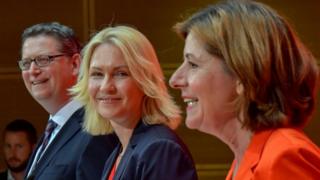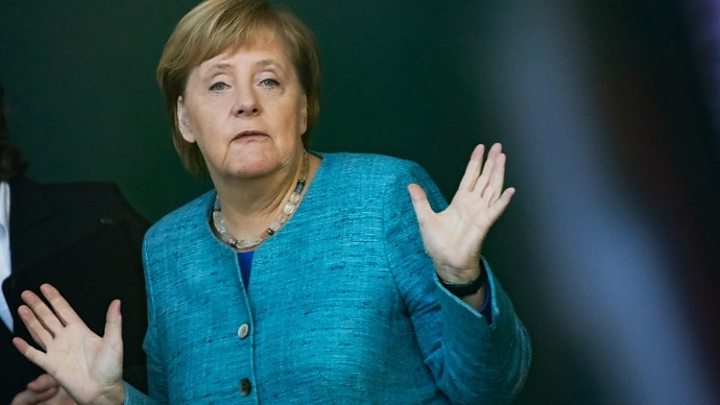Trio set for interim leadership of Germany’s SPD
Three senior members of Germany’s embattled Social Democratic Party (SPD) are set to take over on an interim basis after its leader quit.
Outgoing SPD leader Andrea Nahles has resigned over her party’s poor performance in the European elections.
Her resignation has raised concerns that Chancellor Angela Merkel’s coalition government could collapse.
Mrs Merkel’s Christian Democratic Union party says it wants to stay in power with the SDP, its coalition partner.
CDU party leader Annegret Kramp-Karrenbauer denied that the issue of snap elections was raised during the talks, but said that her party was “prepared for whatever comes”.
Three caretaker leaders are set to take over until Ms Nahles’ successor is elected: Manuela Schwesig is state premier in Mecklenburg-Vorpommern, Malu Dreyer is premier in Rhineland-Palatinate and Thorsten Schäfer-Gümbel is party leader in the Hesse.
Germany’s DPA news agency says the temporary joint leadership has been proposed to the party’s executive board, which met in Berlin on Monday.
Ms Nahles’ long-term replacement is yet to be determined, leaving Mrs Merkel’s “grand coalition” hanging in the balance until a decision is made.
At a press conference, Ms Dreyer said her party would “stick to our agreement” with Mrs Merkel’s CDU until 24 June. On that date, SPD leaders will discuss the “revision clause” for their governing coalition, she said.
Rolf Mützenich, who currently serves as deputy chairman of the SPD, was proposed as interim head of the party’s parliamentary group, the agency added.
The Social Democrats came third, behind Mrs Merkel’s Christian Democrats (CDU) and the Greens, in the 26 May elections.
The poor result has caused disquiet in the party, whose left-wing members have criticised Ms Nahles for remaining in the coalition.
Ms Nahles became SPD leader in April 2018, replacing Martin Schulz who had also resigned because of poor electoral performance. She had been expected to run for the position again and her resignation took analysts by surprise.
She said farewell to her party’s leadership at its Berlin HQ on Monday, thanking them “for the years of good co-operation” in a press conference afterwards.
The coalition between the CDU and the SPD is due to last until federal elections in 2021, but correspondents say Ms Nahles’s resignation could lead to the SPD leaving, triggering a snap poll.
Mrs Merkel herself plans to step down as chancellor in 2021, having already resigned as CDU leader at the end of last year.
No obvious choice
Analysis by BBC Berlin Correspondent Damien McGuinness
Many never wanted the SPD to be in government again in the first place.
Party left-wingers blame plummeting support on years of messy compromise with Angela Merkel’s conservatives.
Now pressure is growing on the SPD to quit the coalition and bring down the government, in the hope that fresh elections would help them ditch the conservatives and build a left-wing coalition.
The problem is new elections are unlikely to help. Current polls place the SPD in third place after the Greens. There is no leader-apparent ready to take over. And the party’s message on many big issues, from climate change to migration, remains unclear.
In 2017 it took six months of wrangling to form this government. That was followed by half a year of internal bickering that exasperated voters.
The only parties that would benefit from more struggles for power within Germany’s two big parties would be the Greens and the far-right AfD.
What next for the coalition?
CDU party members were also meeting to discuss the crisis as the junior partner in the coalition considered its next step.
Ms Kramp-Karrenbauer, the party leader, told reporters that the CDU was willing to continue sharing power with the Social Democrats. “We want to do justice to the government mandate,” she said.
Mrs Merkel said the SPD’s appointment of three caretaker leaders would not “hinder” the work of the coalition government. “I don’t have the impression that this is a sign of instability,” she said.
Several senior party figures in the Social Democrats, including Vice-Chancellor Olaf Scholz and Lower Saxony’s Prime Minister, Stephan Weil, have ruled themselves out of the leadership race.
Former SDP leader Thomas Oppermann said it could take “one, two months” to choose Ms Nahles’ replacement.
He said the political instability was “not a good overall situation” and warned his party against “waiting for further defeats”, alluding to the forthcoming elections in three East German states in September and October.
Polls suggest the SDP may suffer losses in those elections. In a Forsa survey, the SPD dropped by five percentage points to 12%, its lowest-ever score on a national level.
Ms Nahles said on Sunday she would stand down as SPD leader and as head of its parliamentary group.
“The discussions within the parliamentary faction and feedback from within the party have shown me that I no longer have the necessary support to carry out my duties,” she said in a a statement.
A new leader was due to be elected at the party’s conference in December. But party chiefs could bring that vote forward in light of Ms Nahles’ resignation.
What if the coalition falls?
If the SPD were to leave the coalition, the fall of the government would be likely to trigger fresh elections.
Olaf Scholz told Tagesspiegel newspaper he had ruled out entering another such coalition.
“Three grand coalitions in a row would not do democracy in Germany any good,” he said in the interview before Ms Nahles announced her resignation.
The latest crisis come days after Mrs Merkel dismissed reports of a rift with Mrs Kramp-Karrenbauer.
Two unidentified officials quoted in a Bloomberg article had said Mrs Merkel believed her successor was not up to the job. But the German chancellor dismissed the claims as nonsense.
Source: Read Full Article




